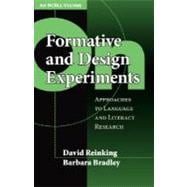
Note: Supplemental materials are not guaranteed with Rental or Used book purchases.
Purchase Benefits
What is included with this book?
| From the NCRLL Editors | p. vii |
| Acknowledgments | p. ix |
| Introduction | p. 1 |
| What Are Formative and Design Experiments? | p. 5 |
| How do formative and design experiments fit into the methodological landscape and where did they come from? | p. 13 |
| What terms have been used to describe this approach to research? | p. 13 |
| What are the defining characteristics of formative and design experiments? | p. 16 |
| How do formative and design experiments compare with other approaches to investigating interventions in classrooms? | p. 22 |
| What is the origin of formative and design experiments? | p. 28 |
| Why are formative and design experiments needed and useful? | p. 33 |
| What kind of knowledge do formative and design experiments lay claim to creating and on what basis is that claim made? | p. 35 |
| Can the results of formative and design experiments be generalized? | p. 39 |
| What Are the Methods of Formative and Design Experiments? | p. 43 |
| What types of data are collected? | p. 45 |
| What are the goals of data collection? | p. 48 |
| What are standards for determining methodological rigor? | p. 53 |
| What methodological frameworks might be used to conceptualize, plan, conduct, and report formative and design experiments? | p. 61 |
| Foundational frameworks | p. 62 |
| Explicit frameworks | p. 65 |
| What practical, ethical, and methodological issues have we encountered in using this approach? | p. 78 |
| What stance should a researcher take in classrooms and working with teachers? | p. 78 |
| How do researchers find and set up an appropriate site for research? | p. 82 |
| Can a researcher also be the teacher in a formative or design experiment? | p. 85 |
| When should the intervention phase end? | p. 86 |
| How do the results of a formative or design experiment complement other approaches to research? | p. 87 |
| How do researchers deal with troubling information? | p. 87 |
| What Are Some Good Examples of Formative and Design Experiments? | p. 89 |
| Why is it difficult to find and to select good examples? | p. 89 |
| What studies illustrate the diversity of this approach? | p. 91 |
| How have instructional interventions been defined and implemented? | p. 100 |
| Is There a Formative or Design Experiment in Your Future? | p. 107 |
| What is the current status and future potential of this approach? | p. 107 |
| What challenges and obstacles constrain the future of this approach? | p. 110 |
| What are the key advantages arguing for continued and expanded use? | p. 113 |
| Who should consider conducting a formative or design experiment? | p. 115 |
| What do we think about formative and design experiments after writing this book? | p. 117 |
| References | p. 121 |
| Index | p. 128 |
| About the Authors | p. 134 |
| Table of Contents provided by Ingram. All Rights Reserved. |
The New copy of this book will include any supplemental materials advertised. Please check the title of the book to determine if it should include any access cards, study guides, lab manuals, CDs, etc.
The Used, Rental and eBook copies of this book are not guaranteed to include any supplemental materials. Typically, only the book itself is included. This is true even if the title states it includes any access cards, study guides, lab manuals, CDs, etc.